Krishna Lal Chadha | |
|---|---|
| Born | 15 November 1936 (age 88) Bhopalwala, Sialkot, British India |
| Occupation | Horticultural scientist |
| Years active | Since 1963 |
| Awards | Padma Shri Borlaug Award Om Prakash Bhasin Award Dr. H. M. Marigowda Award S. K. Mitra Memorial Award S. S. Ranade Memorial Life Time Achievement Award HSI-Shivashakthi Life Time Achievement Award AIKGA Millennium Achievement Award Dr. B. P. Pal Memorial Award NAAS Leadership Award |
| Website | Official web site |
Krishna Lal Chadha is an Indian horticultural scientist, author and a former National Professor of the Indian Council of Agricultural Research. [1] He was honored by the Government of India, in 2012, with the fourth highest Indian civilian award of Padma Shri. [2]
Krishna Lal Chadha was born to a Punjabi Hindu Brahmin family on 15 November 1936 in Bhopalwala, Sialkot, in the British India, presently in Pakistan. [3] [4] His schooling was at the Government High School, Jalandhar from 1948 to 1951 after which he joined Panjab University, Chandigarh from where he secured BSc (Agriculture) in 1955 and MSc (Horticulture) in 1960. [4] Thereafter, he joined the Indian Agricultural Research Institute, New Delhi for higher research and obtained a PhD in 1964. [3] [5]
Chadha started his career as an Assistant Horticulturist at the Indian Agricultural Research Institute in 1963 and worked only for a year to move to Punjab Agricultural University, Ludhiana as a Fruit Specialist in 1964. [4] After working there for five years, he joined the Indian Institute of Horticultural Research (IIHR), Bengaluru in 1969 as Senior Horticulturist. In 1972, he moved to the Central Mango Research Station, Lucknow as the Project Coordinator (Fruits) and, later, got promoted as the Head of the Centre. [4] The next move was back to IIHR, Bengaluru as the Director of the institute in 1980 for a stint till 1986 when he was called to the government cadre as the Horticultural Commissioner, Government of India [6] and later, as the Executive Director of the National Horticultural Board. [7] In 1987, he was promoted as the Deputy Director General of the Indian Council of Agricultural Research from where he retired in 1996. [3] In 1997, he was selected as the ICAR National Professor, [6] a post he held till 2001 and is an adjunct professor of the Indian Agricultural Research Institute ever since. [3]
Krishna Lal Chadha has held the chairs of the Indian Society of Agri-business Professional (ISAP), International Mango Working Group and the Indian Agribusiness Systems (Agriwatch), New Delhi during 2007-08. [4] He is a former president of various national level agricultural societies such as the Indian Society of Agriculture Sciences, the Bougainvillea Society of India, the Orchid Society of India and the Mushroom Society of India. He has also been the vice president of the Indian Society of Vegetable Sciences and the Rose Society of India. He is the chief patron of the Association for Improvement in Production and Utilization of Banana and All India Kitchen Garden Association [4] and has served the Board of Trustees of the International Potato Center (CIP), Lima, Peru, seven years as a member and three years as its vice chairman. [3] [4] He has also worked as the secretary of the sub group on Viticulture for South- East Asia and the vice chairman of the Commission on Tropical and Sub-Tropical Horticulture. [4] He has been a consultant to several international agencies such as Food and Agriculture Organization for the fruit production in eight countries of Asia, Genetic Resources in Thailand, USAID on mango production to Horticultural Export Improvement Association (HEIA), Cairo, Egypt, Bioversity International (former IPGRI) on genetic resources in citrus, mango and sub-tropical fruits and the World Bank on nursery production of horticulture and Forestry species. [4] He is the incumbent president of the Horticultural Society of India. [8] [9]
Chadha is a Fellow of the International Society for Horticultural Science, [10] a US based forum of the scientific and technical professionals in the field of horticulture. [11] and is a member of several workgroups within the organization. [8] He also holds fellowships of the National Academy of Agricultural Sciences, [3] [12] the Horticultural Society of India [4] and the Indian Society of Vegetable Science. [13] He has been the chairman of such government and professional agencies as National Planning Commission of India working group for Horticulture Development in India, National Committee for oilpalm cultivation, Registration Committee for Pesticides, High Power Committee on Restructuring of Department of Agriculture, High Power Committee for Horticulture in the states of West Bengal, Haryana and Gujarat. [4] He has also been a member of the National Steering Committee for Organic Products, Planning Commission Committee for Mid-term Review of the eleventh Five Year Plan and two Task Forces for the Government of Kerala and Government of Rajasthan. [4]
Krishna Lal Chadha lives in New Delhi, where the Horticultural Society of India has its headquarters. [3]
Chadha is credited with 30 books on the topics of agriculture and horticulture, [14] which include Advances in Horticulture, [15] a 13 volume publication covering 9410 pages. [4] He has also brought out a Handbook of Horticulture. [16] Some of the other notable books are Biotechnology of Horticulture and Plantation Crops, [17] Agriculture and Environment, [18] The Grape : Improvement, Production and Post-Harvest Management [19] and The Apple : Improvement, Production and Post Harvest Management. [20] Many books on horticulture and agriculture have cited Chadha in their works. [21] [22]
Krishna Lal Chadha has been conferred the doctoral degree of DSc (Honoris Causa) by the Chandra Shekhar Azad University of Agriculture and Technology in 1995. Two other universities, Orissa University of Agriculture and Technology and Rajendra Prasad Agricultural University followed suit in 2008 and 2009 respectively. [3] [4] He received Borlaug Award in 1984, Om Prakash Bhasin Award in 1992, Dr. H. M. Marigowda Award in 1996, S. K. Mitra Award in 1998 and S. S. Ranade Memorial Award in 1999. [3] [4] He is also a recipient of honors such as the All India Kitchen Garden Association Millennium Achievement Award (2001), NAAS Dr. B. P. Pal Memorial Award (2004), HSI-Shivashakthi Life-Time Achievement Award (2007) and the National Agriculture Leadership Award (2008). [3] [4] In 2012, the Government of India included Chadha in the Republic Day honours list for the award of Padma Shri. [2] [3]

Wheat is a group of wild and domesticated grasses of the genus Triticum. They are cultivated for their cereal grains, which are staple foods around the world. Well-known wheat species and hybrids include the most widely grown common wheat, spelt, durum, emmer, einkorn, and Khorasan or Kamut. The archaeological record suggests that wheat was first cultivated in the regions of the Fertile Crescent around 9600 BC.
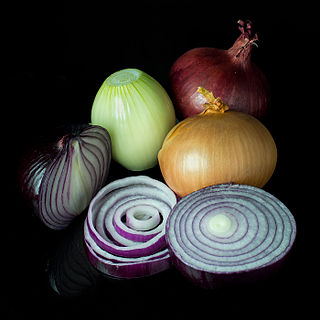
An onion, also known as the bulb onion or common onion, is a vegetable that is the most widely cultivated species of the genus Allium. The shallot is a botanical variety of the onion which was classified as a separate species until 2011. The onion's close relatives include garlic, scallion, leek, and chives.

Cauliflower is one of several vegetables cultivated from the species Brassica oleracea in the genus Brassica, which is in the Brassicaceae family.

Horticulture is the science and art of growing fruits, vegetables, flowers, or ornamental plants. Horticulture is commonly associated with the more professional and technical aspects of plant cultivation on a smaller and more controlled scale than agronomy. There are various divisions of horticulture because plants are grown for a variety of purposes. These divisions include, but are not limited to: propagation, arboriculture, landscaping, floriculture and turf maintenance. For each of these, there are various professions, aspects, tools used and associated challenges; Each requiring highly specialized skills and knowledge of the horticulturist.
Biodynamic agriculture is a form of alternative agriculture based on pseudo-scientific and esoteric concepts initially developed in 1924 by Rudolf Steiner (1861–1925). It was the first of the organic farming movements. It treats soil fertility, plant growth, and livestock care as ecologically interrelated tasks, emphasizing spiritual and mystical perspectives.
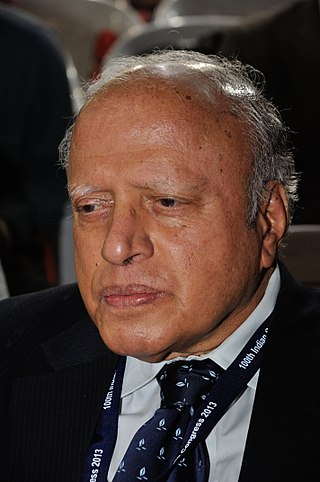
Mankombu Sambasivan Swaminathan was an Indian agronomist, geneticist, administrator and humanitarian. Swaminathan was a global leader of the green revolution. He has been called the main architect of the green revolution in India for his leadership and role in introducing and further developing high-yielding varieties of wheat and rice.
Edaphology is concerned with the influence of soils on living beings, particularly plants. It is one of two main divisions of soil science, the other being pedology. Edaphology includes the study of how soil influences humankind's use of land for plant growth as well as people's overall use of the land. General subfields within edaphology are agricultural soil science and environmental soil science. Pedology deals with pedogenesis, soil morphology, and soil classification.

Sorghum bicolor, commonly called sorghum and also known as great millet, broomcorn, guinea corn, durra, imphee, jowar, or milo, is a species in the grass genus Sorghum cultivated for its grain. The grain is used as food by humans, while the plant is used for animal feed and ethanol production. Sorghum originated in Africa, and is now cultivated widely in tropical and subtropical regions.
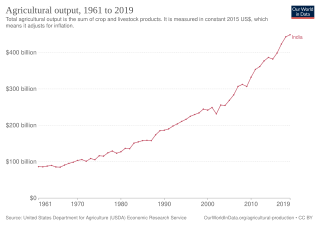
The history of agriculture in India dates back to the Neolithic period. India ranks second worldwide in farm outputs. As per the Indian economic survey 2020 -21, agriculture employed more than 50% of the Indian workforce and contributed 20.2% to the country's GDP.
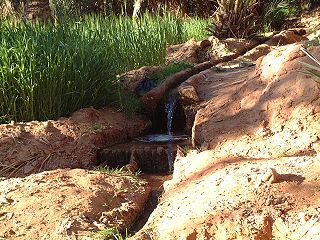
The Arab Agricultural Revolution was the transformation in agriculture in the Old World during the Islamic Golden Age. The agronomic literature of the time, with major books by Ibn Bassal and Ibn al-'Awwam, demonstrates the extensive diffusion of useful plants to Medieval Spain (al-Andalus), and the growth in Islamic scientific knowledge of agriculture and horticulture. Medieval Arab historians and geographers described al-Andalus as a fertile and prosperous region with abundant water, full of fruit from trees such as the olive and pomegranate. Archaeological evidence demonstrates improvements in animal husbandry and in irrigation such as with the saqiyah waterwheel. These changes made agriculture far more productive, supporting population growth, urbanisation, and increased stratification of society.
Ratooning is the agricultural practice of harvesting a monocot crop by cutting most of the above-ground portion but leaving the roots and the growing shoot apices intact so as to allow the plants to recover and produce a fresh crop in the next season. This practice is widely used in the cultivation of crops such as rice, sugarcane, banana, and pineapple. Ratoon crops cannot be perennially renewed, and may be harvested only for a few seasons, as a decline in yield tends to occur due to increased crowding, damage by pests and diseases, and decreasing soil fertility.
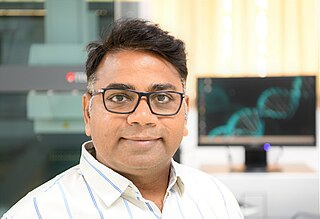
Rajeev Kumar Varshney is an Indian agricultural scientist, specializing in genomics, genetics, molecular breeding and capacity building in developing countries. Varshney is currently serving as director, Western Australian State Agricultural Biotechnology Center; director, Centre for Crop & Food Innovation; and International Chair in Agriculture & Food Security with the Food Futures Institute at Murdoch University, Australia since Feb 2022. Before joining Murdoch University, Australia he served International Crops Research Institute for the Semi-Arid Tropics (ICRISAT), a global agriculture R&D institute, for more than 16 years in different scientific and research leadership roles including Research Program Director for three global research programs– Grain Legumes, Genetic Gains and Accelerated Crop Improvement Program. He has the onus of establishing and nurturing the Center of Excellence in Genomics & Systems Biology (CEGSB), a globally recognized center for genomics research at ICRISAT that made impacts on improving agriculture and development of human resources in several countries including India, China, Kenya, Ethiopia, Tanzania, Nigeria, Ghana, Mali, Senegal, Burkina Faso, etc. Varshney holds Adjunct/Honorary/Visiting Professor positions at 10 academic institutions in Australia, China, Ghana, Hong Kong and India, including The University of Western Australia, University of Queensland, West Africa Centre for Crop Improvement, University of Hyderabad, Chaudhary Charan Singh University and Professor Jayashankar Telangana State Agricultural University.

The Indian Institute of Horticultural Research (IIHR) is an autonomous organization acting as a nodal agency for basic, strategic, anticipatory and applied research on various aspects of horticulture such as fruits, vegetable, ornamental, medicinal and aromatic plants and mushrooms in India. The institute has its headquarters in Bengaluru, Karnataka, India and is a subsidiary of Indian Council of Agricultural Research (ICAR), New Delhi, under the Ministry of Agriculture and Farmers' Welfare. It recently has been ranked 1st for the combined years 2019-20 and 2020–21 by the ICAR.

The Central Institute of Agricultural Engineering (CIAE) is a higher seat of learning, research and development in the field of agricultural engineering, situated in the lake city of Bhopal, Madhya Pradesh, India. It is an autonomous body, an Indian Council of Agricultural Research subsidiary, under the Ministry of Agriculture & Farmer's Welfare, Government of India.

Brahma Singh is an Indian Horticultural scientist, known for his expertise on protected cultivation and his efforts in developing agro-technologies for the high altitude areas of the Himalayan region of Leh and for identifying and popularizing the fruit crops of seabuckthorn and Indian mulberry (Noni). The Government of India honoured him, in 2014, by awarding him the Padma Shri, the fourth highest civilian award, for his contributions to the fields of science and technology.

Virender Lal Chopra was an Indian biotechnologist, geneticist, agriculturalist and a director-general of the Indian Council of Agricultural Research (ICAR), known to have contributed to the development of wheat production in India. He was the chancellor of Central University of Kerala, a Chancellor of the Central Agricultural University, Imphal and a member of the Planning Commission of India. An elected fellow of several science academies such as Indian Academy of Sciences, Indian National Science Academy, National Academy of Agricultural Sciences, National Academy of Sciences, India, European Academy of Sciences and Arts and The World Academy of Sciences (TWAS), he was a recipient of a number of honors including Borlaug Award, FAO World Food Day Award and Om Prakash Bhasin Award. The Government of India awarded him the third highest civilian honour of the Padma Bhushan, in 1985, for his contributions to agricultural science.
Narinder Singh Randhawa (1927–1996) was an Indian agricultural scientist, writer and the director general of the Indian Council of Agricultural Research (ICAR). He was the president of the Indian Society of Soil Science during 1980–81 term and was a recipient of National Citizen Award and Rafi Ahmed Kidwai Award of the Indian Council of Agricultural Research. The Government of India awarded him the third highest civilian honour of the Padma Bhushan, in 1989, for his contributions to agricultural science.
Tilak Raj Sharma is an Indian plant biologist, the deputy director general (CS) of ICAR and former executive director and chief executive officer of the National Agri-Food Biotechnology Institute (NABI), and Center of Innovative and Applied Bioprocessing (CIAB) respectively, both autonomous institutes under the Department of Biotechnology. Known for his studies in the fields of genomics and plant disease resistance, Sharma is an elected fellow of the National Academy of Sciences, India, the National Academy of Agricultural Sciences and the Indian National Science Academy. The Department of Biotechnology of the Government of India awarded him the National Bioscience Award for Career Development, one of the highest Indian science awards, for his contributions to biosciences in 2007.
Manoj Prasad is an Indian plant geneticist, molecular biologist and working as a Professor in Department of Genetics at Delhi University. Previously, he worked as a Senior Scientist and JC Bose National Fellow at the National Institute of Plant Genome Research (NIPGR) from 2004 to 2023. Known for his research on the stress biology of plants and virology, he is an elected fellow of the Indian National Science Academy, the National Academy of Sciences, India, the National Academy of Agricultural Sciences and the Indian Virological Society and was a recipient of the Alexander von Humboldt Fellowship. The Department of Biotechnology of the Government of India awarded him the National Bioscience Award for Career Development, one of the highest Indian science awards, for his contributions to biosciences, in 2014.
Ramesh Chandra Ray is an agriculture and food microbiologist, author, and editor. He is the former principal scientist (microbiology), and head of the Regional Centre at Indian Council of Agricultural Research ICAR - Central Tuber Crops Research Institute in Bhubaneswar, India.